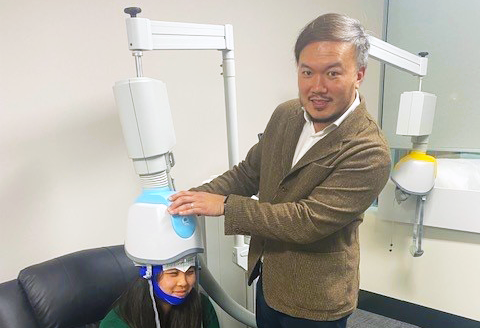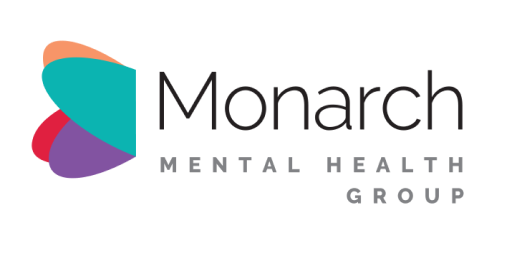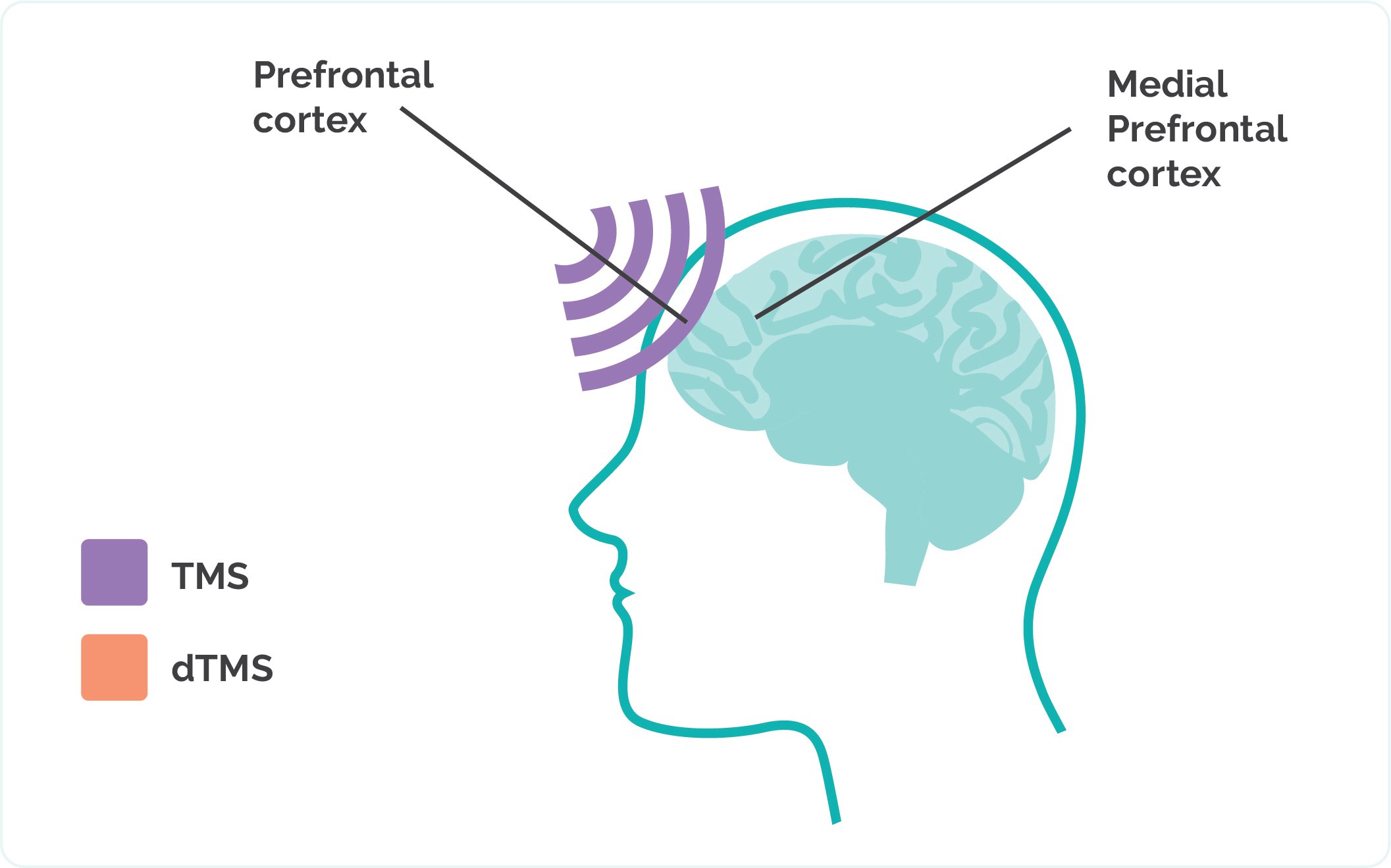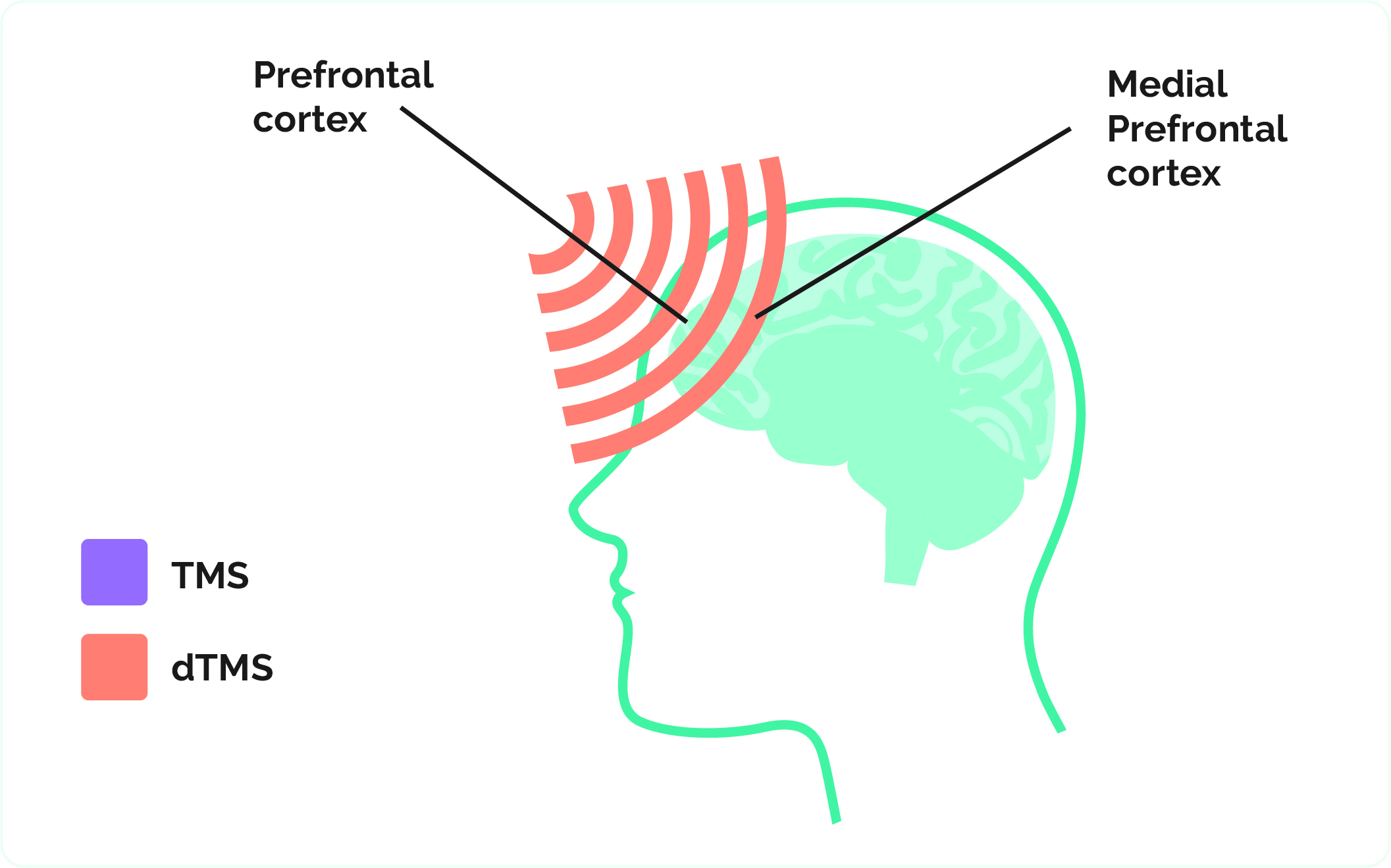Deep Transcranial Magnetic Stimulation (dTMS)
Deep transcranial magnetic stimulation (dTMS) is a cutting-edge therapy offering new hope for individuals struggling with treatment-resistant mental health conditions. At Monarch Mental Health Group (MMHG), we leverage this innovative technology to deliver personalised treatment plans for obsessive-compulsive disorder (OCD) and Major Depressive Disorder (MDD).
What is Deep Transcranial Magnetic Stimulation?
Deep transcranial magnetic stimulation is a specialised form of transcranial magnetic stimulation (TMS), also called intermittent theta burst stimulation. It utilises a unique coil design that delivers electromagnetic pulses deeper and more broadly within the brain compared to traditional TMS. This deeper reach into the prefrontal cortex allows dTMS to target specific brain regions more effectively, potentially leading to significant improvements in symptoms.
What Conditions Can dTMS Therapy Treat?
Deep transcranial magnetic stimulation has shown particular promise in treating:
-
Obsessive-Compulsive Disorder (OCD)
Research shows dTMS therapy can significantly reduce OCD symptoms for many patients, especially when targeting the medial prefrontal cortex, a brain region involved in regulating behaviour. -
Major Depressive Disorder (MDD)
Studies show dTMS therapy can be an effective treatment option for depression, particularly when traditional methods haven't yielded satisfactory results or patients are resistant to medication. -
Other Conditions
Ongoing research explores the potential benefits of dTMS and intermittent theta burst stimulation for treating other conditions such as anxiety disorders, chronic pain, and tinnitus.
Benefits of Deep Transcranial Magnetic Stimulation Therapy
-
Non-invasive and painless
Similar to traditional Transcranial Magnetic Stimulation, dTMS is a non-invasive procedure requiring no anaesthesia or hospitalisation. The treatment is generally well-tolerated with minimal side effects. -
Targeted approach
The deeper penetration of dTMS allows for more precise stimulation of specific brain regions, potentially leading to more focused treatment compared to medications. -
Fewer side effects
Compared to medications, dTMS has a lower risk of side effects, making it a suitable option for individuals who cannot tolerate medications or experience significant side effects. -
Faster onset of action
While results may vary, some patients experience an improvement in symptoms sooner with dTMS compared to traditional therapies. -
Can be used with other therapies
dTMS therapy can be combined with psychotherapy and medication management for a more comprehensive treatment approach.
How Does dTMS Work?
Like repetitive transcranial magnetic stimulation, dTMS uses short magnetic pulses to stimulate specific areas of the brain in the prefrontal cortex associated with mood regulation. However, dTMS uses a specially designed coil to achieve deeper and broader penetration of electromagnetic stimulation into the brain. In people with obsessive-compulsive disorder, stimulation of the medial prefrontal cortex has been found to improve symptoms.
During treatment, a magnetic coil is placed near your scalp, delivering painless pulses that activate or inhibit nerve cell activity. The targeted magnetic pulses stimulate nerve cells in specific brain regions, leading to changes in their activity and communication patterns. This alteration in brain function is believed to promote symptom improvement in various mental health conditions, including treatment resistant depression and major depression. For patients with OCD, research has found that the benefits of dTMS are greater if the targeted areas of the brain are active at the time of treatment. Symptom provocation is designed to activate areas involved in OCD symptoms prior to treatment. The purpose of this is to bring on your symptoms of OCD, but only to a limited degree of severity, immediately before the treatment session.
| Real-World Study | RCT Meta-Analysis | The Monarch Clinic Australia | |
| 5,010 TMS treated patients (103 sites)* | 1132 TMS Treated Australian Patients** | 130 TMS Treated patients*** | |
| Response | 58% | 47% | 55% |
| Remission | 28% | 31% | 34% |
*Response and remission assessed using Patient Health Questionnaire 9 (PHQ 9( and/or the Clinical GLobal Impression - Severity Scale (CGI-S)
**Response and remission assessed using HAMD-MADRS
***Response and remission assessed using QIDS-CR
RCT: Randomised COntrolled Trial
Transcranial: Passing through the skull
How Effective is Deep Transcranial Magnetic Stimulation?
Research on dTMS, particularly for OCD, shows promising results. Studies indicate significant symptom reduction in many patients who haven't found relief through traditional therapies. At MMHG, we will discuss your specific situation and potential outcomes during the consultation process.
Who is a Good Candidate for dTMS?
Deep transcranial magnetic stimulation may be an option for individuals who:
- Have experienced treatment-resistant obsessive compulsive disorder, depression, or other conditions.
- Cannot tolerate or experience significant side effects from medications.
- Are seeking an alternative treatment approach alongside therapy.
- Require a more intensive approach than what is offered by repetitive transcranial magnetic stimulation

The dTMS Process at Monarch Mental Health Clinics
Initial Consultation
During the initial consultation, a psychiatrist at MMHG will thoroughly evaluate your medical and psychiatric history. They will discuss your symptoms, treatment history, and any current medications you are taking. This comprehensive evaluation will determine if dTMS is a suitable treatment option for you.
Treatment Planning
If dTMS is deemed appropriate, our team will develop a personalised treatment plan specific to your needs. This plan will outline the targeted brain region, the number of treatment sessions, and the frequency of stimulation.
Symptom Provocation (For OCD)
For OCD treatment, a technique called symptom provocation may be incorporated into the plan. This involves temporarily triggering your OCD symptoms, to a mild degree, immediately before the dTMS session. Research suggests this can enhance the treatment's effectiveness.
Treatment Sessions
Like repetitive transcranial magnetic stimulation sessions, dTMS sessions typically last 30-60 minutes and are performed on an outpatient basis. You will be comfortably seated in a chair while the specialised coil delivers magnetic pulses to the targeted brain region. You may experience a tapping sensation on your head during the brain stimulation session.
Monitoring and Follow-up
Our team will closely monitor your progress throughout the treatment and adjust the plan as needed. Following the treatment course, follow-up appointments will be scheduled to monitor your long-term response and overall mental health.
Start Your Journey to Better Mental Health with Monarch Mental Health Group
dTMS offers a promising and innovative approach to treating mental health conditions, particularly those resistant to traditional methods. At Monarch Mental Health Group, our team of experts is dedicated to providing you with personalised care and cutting-edge deep brain stimulation therapy. Contact us today to schedule a consultation and discuss if dTMS is right for you.
Frequently Asked Questions
No, like repetitive transcranial magnetic stimulation, dTMS is a painless procedure involving noninvasive brain stimulation. You may experience a tapping sensation on your head during the session, but it is generally well-tolerated.
The number of sessions needed will vary depending on the individual and the condition being treated. Typically, a course of treatment involves daily sessions for several weeks.
Some patients may experience mild and temporary side effects following dTMS sessions, such as:
- Headaches: This is the most common side effect and can usually be managed with over-the-counter pain relievers.
- Scalp discomfort: You may feel a tingling or tapping sensation on your scalp during the session. This typically subsides shortly after the treatment.
- Lightheadedness: Some individuals may experience brief dizziness following a session, which usually resolves quickly.
It's important to report any side effects you experience to your doctor at MMHG. Our team will monitor your well-being throughout the treatment and adjust the settings if necessary to minimise any discomfort.
The timeframe for experiencing results from dTMS can vary depending on the individual and the condition being treated, such as depression or obsessive-compulsive disorder. Some patients may begin to feel improvement within a few weeks, while others may take several weeks or even months to experience the full benefits.
Insurance coverage for dTMS can vary depending on your specific plan. We recommend contacting your insurance provider to determine your coverage details. If you wish to claim session costs back via Medicare rebate, you must have a referral from your GP (including a current Mental Health Care Plan) or psychiatrist.
Following the dTMS treatment course, we will schedule follow-up appointments to monitor your long-term progress and overall mental health. Maintaining healthy lifestyle habits and potentially continuing with therapy can help sustain the positive effects of dTMS treatment.



